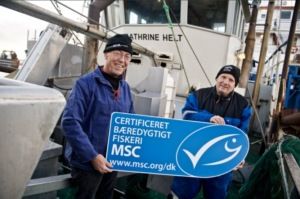News
Danish fishing industry reaches historic sustainability mark
This article is more than 8 years old.
Over 90 percent of the Danish fishing industry is MSC-approved

A blue fish is a green fish (photo: MSC Danmark)
After over a decade of change, the Danish fishing industry reached an impressive milestone this week.
The Danish brown shrimp fishery in the North Sea attained the certificate of sustainability (blue fish label) from the Maritime Stewardship Council (MCS) this week, which means that over 90 percent of the Danish fishing industry is now officially considered sustainable.
“The certificate means the fishing industry will in future have to live up to a number of demands to ensure and document that it is sustainable,” Majken Møller, the head of marketing and communications with MSC Denmark, told DR Nyheder.
READ MORE: Historic Arctic fishing agreement landed
Perfection unrealistic
Being MSC-certified will not just help Denmark’s fish populations thrive, but it will also further open the doors of trade.
Sofie Smedegaard Mathiesen, a consultant with the Danish fishing association Danmarks Fiskeriforening, contends that more and more consumers around the world are demanding fish that have been caught sustainably.
But even though the Danes are tantalisingly close to being 100 percent sustainable, becoming perfect is a challenge that may be too steep to overcome.
“It requires immense knowledge about the fish populations to obtain the MSC certificate, and there are a number of species that we know too little about to be certified under the current rules,” Mathiesen told DR Nyheder.










































